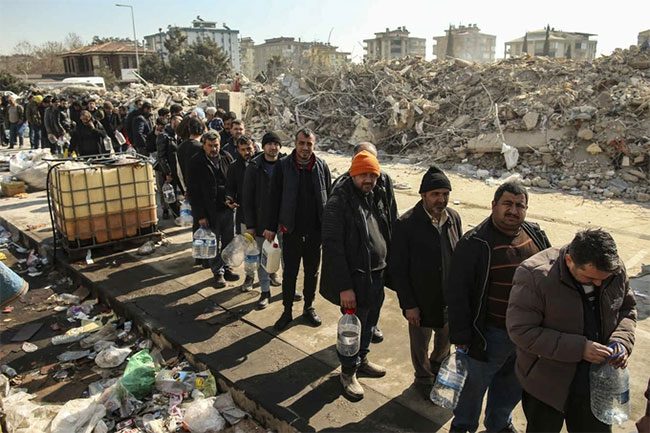The earthquake that struck on the morning of February 6 has devastated the pipeline system and agricultural infrastructure, raising concerns about water pollution and the outbreak of diseases.
As of February 17, the death toll from the earthquake has exceeded 41,000, and the country is facing environmental and health consequences stemming from this disaster.
Specifically, the earthquake has damaged the pipeline networks across dozens of provinces and cities in the southeastern part of the country. Many humanitarian organizations have been forced to distribute bottled water to survivors and install temporary toilets.
Notably, the lack of access to drinking water and sanitation facilities increases the risk of diseases such as cholera, dysentery, or typhoid fever, all of which are transmitted through water contaminated with human waste.

People queueing for water near collapsed buildings in Kahramanmaraş, Turkey on February 12, 2023. (Photo: AP).
The Cholera Threat
Following the earthquake, the World Health Organization (WHO) expressed concerns about the emergence of a “secondary health crisis,” primarily focusing on the spread of diseases.
Professor François-Xavier Weill, Director of the National Reference Center for Vibrio and Cholera at the Pasteur Institute in France, warned: “If these bacteria enter uncontaminated drinking water, it could lead to outbreaks, and unsanitary conditions will promote the spread of diseases.”
He recalled the event in 2010 when many survivors of the earthquake in Haiti contracted cholera, leading to thousands of deaths.
Currently, Turkey has not reported any cases of this disease; however, in Syria, which also experienced thousands of fatalities from the recent earthquake, cholera has reemerged since September 2022, raising significant concerns.
Currently, a cold wave is affecting Syria, which is advantageous as it limits bacterial growth.
Professor François explained: “The low temperatures in the earthquake-affected area may partially reduce the spread of bacteria through water, as they are less active at lower temperatures.”
Chemicals
Another significant environmental impact of the earthquake may stem from a massive fire at the port of Alexandrette, located in Hatay Province, Turkey.
The tremors caused more than 300 containers at this port to collide, resulting in a fire that lasted 90 hours, from February 6 to February 10, releasing a massive plume of black smoke into the environment.
Currently, organizations have not determined whether the materials in the fire are hazardous; however, a Reuters source indicated that they include plastics and chemicals.
In addition to air pollution from the fire, the water used by firefighting teams to extinguish the blaze may spread chemicals as it flows into the port, threatening water environments.
Moreover, the Akkuyu Nuclear Power Plant located in the Mersin region of southern Turkey, under construction by Russia’s Rosatom company, has raised concerns about nuclear risks for residents in the area.
The facility is being built directly on a fault line and experienced significant tremors from the earthquake that occurred early on February 6.
However, the Turkish Nuclear Safety Authority reported to the International Atomic Energy Agency that no damage occurred at this plant.


















































